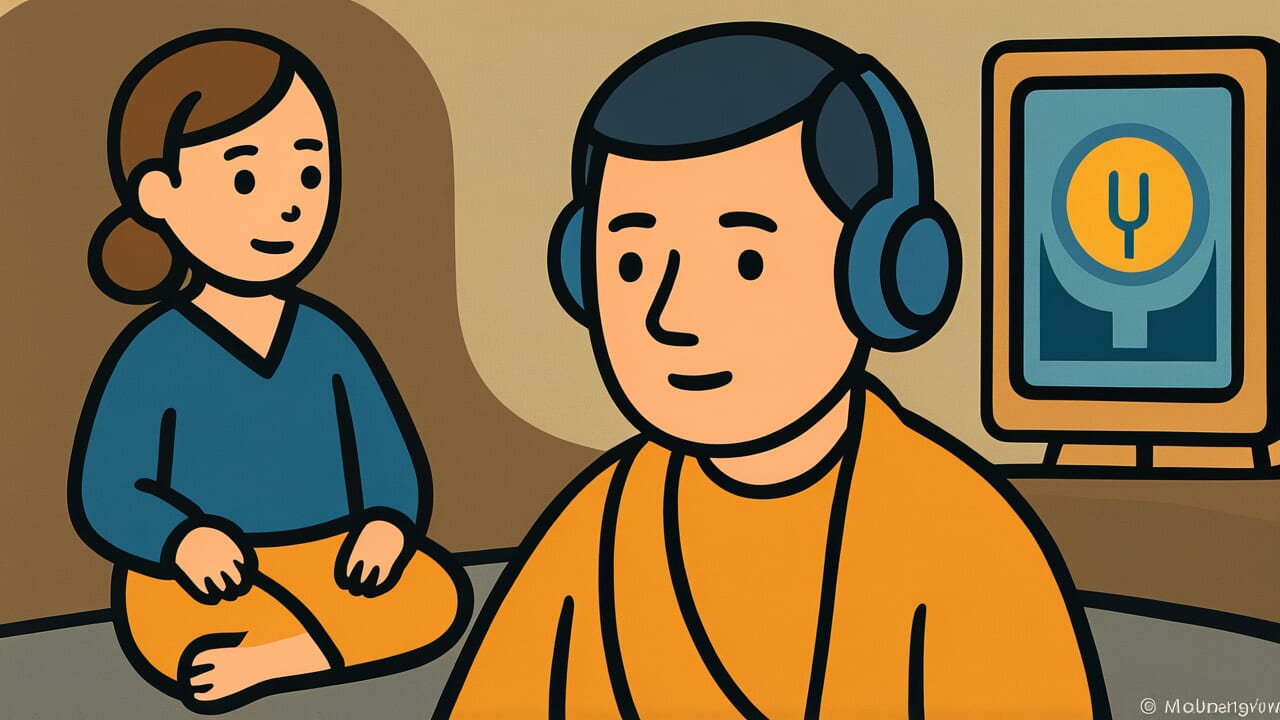How to Read “Listening is the joy of Buddhist law”
Kiku wa hōraku
Meaning of “Listening is the joy of Buddhist law”
“Listening is the joy of Buddhist law” means that listening to others brings peace to your heart and helps you learn at the same time.
This proverb sees listening not just as gathering information, but as a valuable experience that enriches your spirit.
When you listen to someone’s experiences or thoughts, you gain new perspectives. You also feel calm and fulfilled inside.
This happens because listening is an act of respecting others and feeling connected to them. The proverb teaches us the deep value of listening.
Today, we often focus on expressing our own opinions. But this proverb reminds us how important listening is.
You can use this expression in many daily situations. Advice from seniors, worries from friends, or family memories all count.
The proverb shows the double benefit of listening. It brings peace to your heart while giving you wisdom for life.
Origin and Etymology
The word “hōraku” in “Listening is the joy of Buddhist law” likely comes from Buddhist terminology.
In Buddhism, “hōraku” means the joy and peace you feel when you hear Buddhist teachings or practice meditation.
The idea is that listening to sutras and encountering Buddha’s teachings brings deep peace and joy to your heart.
This proverb probably spread as Buddhist thinking became everyday wisdom. At temples, listening to sermons was not just about gaining knowledge.
The act of listening itself was an experience that enriched the heart. Over time, people applied this word to all kinds of listening.
Japan has long placed special value on the act of listening. The culture sees it as a virtue to listen to others rather than just talk.
This proverb reflects the Japanese view of conversation. By listening, you understand others and grow yourself.
This way of thinking may have been born from the fusion of Buddhist teachings and traditional Japanese values.
Usage Examples
- Listening to grandfather’s old stories is listening is the joy of Buddhist law, and I always make new discoveries
- Think of listening to your senior’s failure stories as listening is the joy of Buddhist law, and listen with an open mind
Universal Wisdom
The universal wisdom in “Listening is the joy of Buddhist law” points to a truth about human nature.
We are essentially lonely beings who also seek connection. Each of us lives our own unique life.
But through others’ words, we can glimpse worlds different from our own. This is an experience that opens the heart.
It is a moment when your world expands.
Why does listening bring peace? Because listening means pausing your own thoughts and turning your attention to another person’s existence.
Modern people constantly think, judge, and act. But when listening, we are freed from that busyness.
We can simply be on the receiving side. This receptive attitude brings stillness to the heart.
On a deeper level, this proverb touches the essence of learning. True learning is not cramming knowledge into your head.
It is opening your heart and accepting what comes. Our ancestors knew that a humble listening attitude is the source of growth.
By listening, we absorb others’ experiences as our own and broaden our lives.
This goes beyond simple information exchange. It is an activity that could be called communion of souls.
When AI Hears This
When you analyze asking questions through information theory, you find it is a surprisingly efficient information acquisition system.
In Shannon’s theory, information is measured by the reduction of uncertainty.
For example, in a game guessing heads or tails, your chance without asking is one in two. But if you ask “Is it heads?” once, uncertainty becomes zero.
At that moment, you gained complete certainty with just one bit of information.
What matters here is the ratio between the cost of asking and the amount of information gained.
If you try and fail on your own, reaching the answer after ten failures requires ten times worth of time and energy.
But with a question, you receive information the other person already has in just seconds. The speed of entropy reduction is overwhelmingly faster.
Even more interesting is how information efficiency changes depending on question design.
A vague question like “What should I do?” gives less information per attempt than a focused question like “Which is more effective, A or B?”
This follows the same principle as binary search algorithms. With each question, you can cut the possibility space in half.
Humanity understood this optimal solution for information acquisition intuitively through the phrase “Listening is the joy of Buddhist law” long before knowing the formulas.
When you weigh the psychological cost of embarrassment against the vast amount of information gained, the calculation clearly favors asking.
Lessons for Today
This proverb teaches modern people the importance of consciously making “time to listen” in our busy daily lives.
We often listen to people superficially while looking at our smartphones or thinking about the next appointment.
But when you truly listen with your heart, it becomes a gift to yourself as well.
Specifically, try once a day to just listen to someone without interrupting or giving advice.
A family member’s casual story, a coworker’s complaints, a friend’s dreams. There is always something there that will enrich your heart.
Listening is not a passive act. It is an active effort to understand the other person.
The peace and learning you gain from listening will enrich your own words. People who have listened to many stories develop diverse perspectives.
They become able to speak profound words. Listening is the joy of Buddhist law.
It has the power to change your life quietly but surely.



Comments